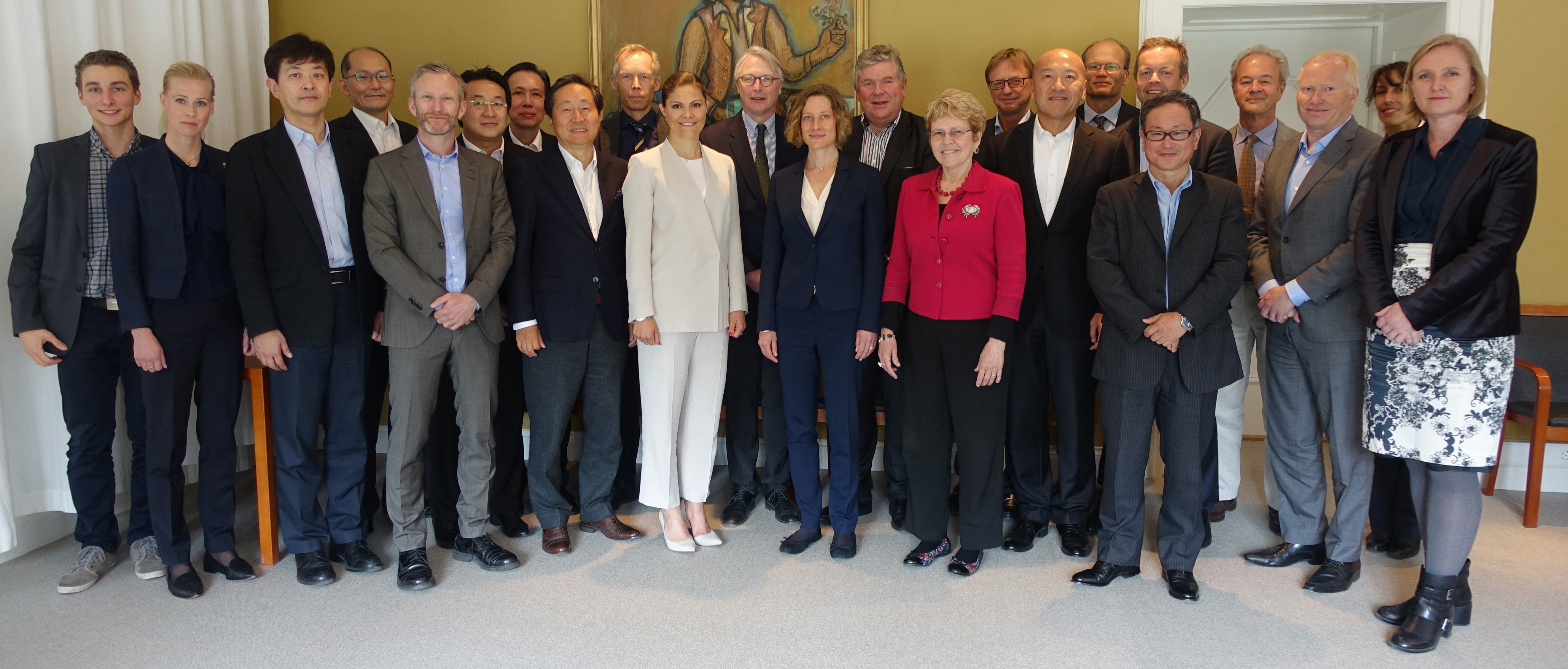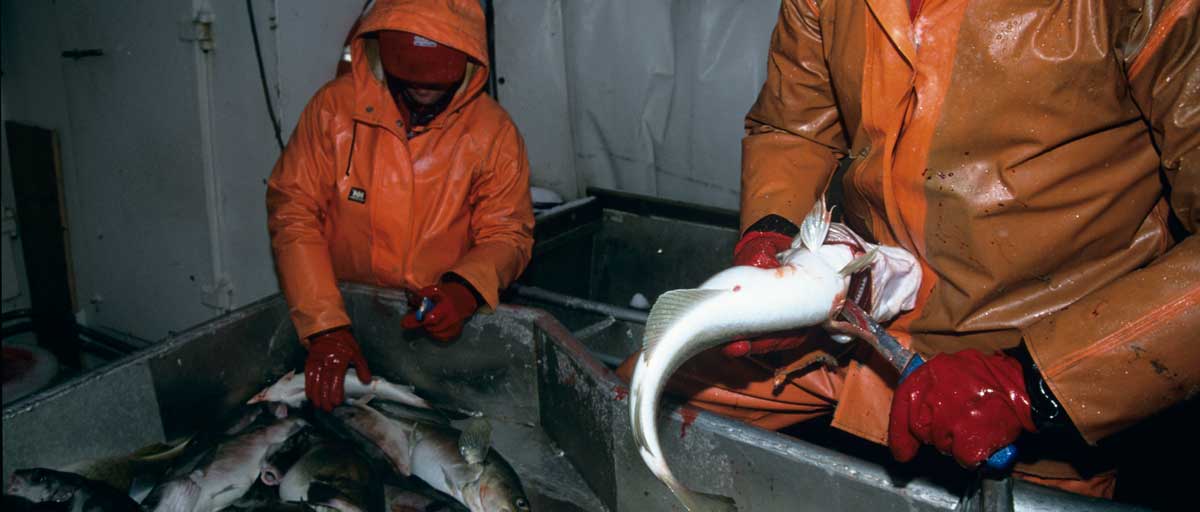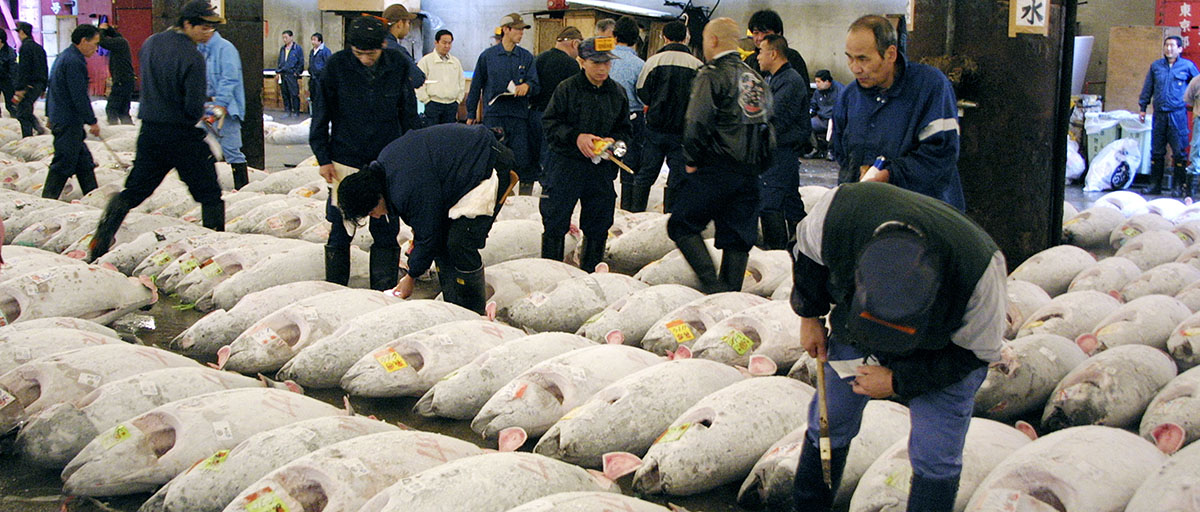
Centre researchers, CEOs from world’s largest seafood companies, and Swedish royalty pictured here in May 2017 in Stockholm, Sweden. They have formed global coalition aiming to end unsustainable practices, such as overfishing, modern slavery, and destructive impacts on habitats and species. HRH Crown Princess Victoria of Sweden supports the initiative. Photo: C. Leijonhufvud
Bildtext får vara max två rader text. Hela texten ska högerjusteras om den bara ska innehålla fotobyline! Photo: B. Christensen/Azote
Ocean stewardship
Scientists as change-makers
Centre scientists and CEO’s of world largest seafood companies form coalition to turn seafood industry more sustainable. New PNAS study highlights the importance and process of science-business partnerships
- PNAS study describes process that helped form SeaBOS, a collaboration between world’s largest seafood corporations and scientists
- Study reports how SeaBOS came to be, and highlights importance of trust and knowledge sharing for successful international environmental cooperation
- Stockholm Resilience Centre has a long and proud tradition of bringing science, business and politics together
If you were to explore the high seas, chances are you would want someone who is analytical, creative, and curious on your ship. If the going got tough, this person could help assess the problem, identify solutions, and determine which route would take you in the direction you want to go. A scientist would fit this bill of characteristics, and could help to navigate, if lost in unknown territory.
The Stockholm Resilience Centre has a long history of helping to navigate the unknown, and bringing together the right people to steer the global ship in a sustainable direction.
An example of this is the science-business global coalition “Seafood Business for Ocean Stewardship” (SeaBOS). Centre researchers Henrik Österblom, Jean-Baptiste Jouffray, Carl Folke, and Johan Rockström spearheaded an initiative that brought together CEOs from several of the world’s largest seafood companies to engage in a dialogue about ocean sustainability.
In a new PNAS study, these centre researchers describe how they engaged with large seafood companies, and explore the importance of working together with transnational corporations as means to promote transformative change, a change that could alter international seafood business, and support global sustainability.
Sustainability scientists need to be adequately trained, and provided with the space, to go deep into processes associated with global transformative change
Henrik Österblom, lead author
The SeaBOS initiative
Starting in 2012 these centre researchers, together with additional colleagues, identified the largest corporations of the global seafood industry, and dubbed them “keystone actors” in marine ecosystems. Inspired by the classical ecology study on “keystone species,” keystone actors are thought to have a disproportionate influence on the structure and function of the ocean.
Based on this work, the researchers engaged with these powerful actors to develop a unique collaboration to address unsustainable practices, such as overfishing, modern slavery, and destructive impacts on habitats and non-target species. The result was major companies from Asia, Europe, and North America forming the SeaBOS initiative.
“If private corporations, which are critically dependent on a healthy ocean for their long-term prosperity, take on a leading role in ocean stewardship, it is good for business and good for the planet,” says Österblom, lead author of the study and a driving force behind the SeaBOS initiative.
SeaBOS is unique in that no other initiative connects: wild capture fisheries and aquaculture; science and business; and companies from three major global markets, Asia, Europe, and North America. It aims to tackle many important hurdles, such as transparency, antibiotic use in aquaculture, and climate change, in a voluntary commitment from these companies.
SeaBOS is supported by HRH Crown Princess Victoria of Sweden, who is an advocate for the Sustainable Development Goals (SDGs). The Crown Princess has been involved with the SeaBOS dialouges between researchers and scientists, and has also supported the initative at a number of important events, such as the 2017 United Nations Oceans conference.
From words to action
The PNAS study describes the process of how SeaBOS came to be. The initial intention was not to coproduce a global coalition of seafood companies and scientists. However, as this initiative emerged, the authors took note, and highlight the processes and implications for global sustainability in their study.
They also provide evidence for how a science-business partnership might function, an area where few scientific case studies exist.
“While substantial literature has focused on how science interacts with policy, relatively little is known about interactions between science and business. The strength of our study is to report in detail on such an interaction while putting it into the broader context of sustainability science”, says Jean-Baptiste Jouffray, PhD student at the Stockholm Resilience Centre, who together with Österblom has been instrumental in the establishment of the initiative.
In this study, the authors highlight the importance and challenges of building relationships and trust between all the actors. Without trust and cooperation among the keystone actors, the SeaBOS initiative would have been an unlikely outcome. Being able to respect different norms and knowledge, as well as translating conversations across cultures and languages, are cited as fundamental in the collaborative process.
However, this does not come without challenges. Österblom notes that, “The most challenging and time-consuming aspects involved establishing trust with CEOs and convincing them that this could add value not only to their operations, reputation, and brands, but also in terms of clarifying their responsibility as global actors and the significance of ocean stewardship for sustainability and prosperity.”
The authors also highlight that in the past, voluntary environmental commitments have produced mixed results. While SeaBOS is voluntary, the fact that it is trust-based, and that members are committed to continue meeting face-to-face, could help its odds in success.
In addition, the authors point out that this unique network, connecting industries, business and science, as well as regions, will increase the interactions among keystone actors. Theoretically, a more connected network is more likely to undergo transformative change. Furthermore, SeaBOS increases interactions between major companies and sectors, thereby promoting sharing of knowledge and technology, which could benefit their business.
The importance of science-business collaborations
Major sustainability challenges facing humanity will increasingly require scientists to take on larger and more active roles in connecting knowledge to action.
By demonstrating how scientists and industry can collaboratively develop solutions to major sustainability issues, this study presents a unique method and case-study, which can potentially be replicated in other sectors.
“The initiative and approach we describe certainly sets an interesting precedence for others to follow, not only for the ocean but also in other sectors,” adds Rockström, co-author and centre executive director.
As the world works towards the SDGs by 2030, the authors point out, “Given the magnitude of the challenges associated with the ocean, the slow pace of progress, and the obvious interconnectivity with other SDGs, we regard our work with companies engaged in production as a relatively unexplored—yet a critically needed niche—to complement efforts focusing on consumption and public policy.”
The new ocean frontier
Explorers once set out across the globe in search of new coastlines, markets, and trading partners. However, maintaining a marine environment that can support humanity and the planet should be thought of as the ocean’s newest, and most essential, frontier.
Österblom concludes that, “Some researchers are trained to explore the frontiers of space, and others are trained to explore the depths of the ocean. However, sustainability scientists need to be adequately trained, and provided with the space, to go deep into processes associated with global transformative change.”
Their work with SeaBOS clearly demonstrates that science and business can engage with one another towards a more sustainable planet.
Carl Folke, co-author of the study and centre scientific director, adds that scientific integirty is essential when working so closely with high-level, business-orietned companies: “Sustainability science is a use-inspired approach, where scientists can both be embedded in, and learn from change processes. Our ambition has been to be impartial knowledge brokers in this process and facilitate a new direction for ocean stewardship.”
Methodology
This study applies transdisciplinary research approaches to the largest actors in the global seafood industry.
To analyze transformative capacity, the authors conducted a network analysis, which relies on publicly available data about companies’ membership in international seafood sustainability initiatives. This was cross-checked through a collaborative exercise with all participating companies for consistency and missing data.
Looking to literature on collaboration and network theory, they describe how this process could be relevant for seafood sustainability, reflect on risks involved with engaging with the private sector, and consider how this process can speak to other global, environmental partnerships.
Österblom, H., Jouffray, J.-B., Folke, C., Rockström, J. (2017) Emergence of a global science-business initiative for ocean stewardship. Proceedings of the National Academy of Science, USA.
Henrik Österblom serves as deputy science director and as associate professor. He is the driving force behind the SeaBOS initiative. His research focuses on globalization and marine social-ecological systems, in particular how fisheries and marine ecosystems are managed.
Jean-Baptiste Jouffray is a joint PhD student of Stockholm Resilience Centre and the Global Economic Dynamics and the Biosphere programme at the Royal Swedish Academy of Sciences. His research explores interactions between humans and the marine ecosystem.
Carl Folke is science director and co-founder of the centre. He has extensive experience in transdisciplinary collaboration between natural and social scientists, and is among the most cited scientists in the world on resilience thinking.
Johan Rockström is director of the centre, and professor of environmental science at Stockholm University. He helped lead the internationally renowned team of scientists that presented the planetary boundaries framework (2009), and update (2015).
Beatrice Crona’s work centers on various aspects of oceans and fisheries governance, as well as understanding different emerging global connectivities and their effects on social-ecological outcomes at multiple scales. She participated as an expert during the second SeaBOS dialogue in Stockholm.
Max Troell is a system ecologist mainly working with environmental problems associated with aquaculture. This work focuses on inter-linkages between aquaculture and fisheries, on different spatial scales. He participated as an expert during the second SeaBOS dialogue in Stockholm.
Lisen Schultz's research focuses on key features and processes of adaptive governance, including learning, collaboration and leadership. She helped design and moderate the second SeaBOS dialogue in Stockholm.








